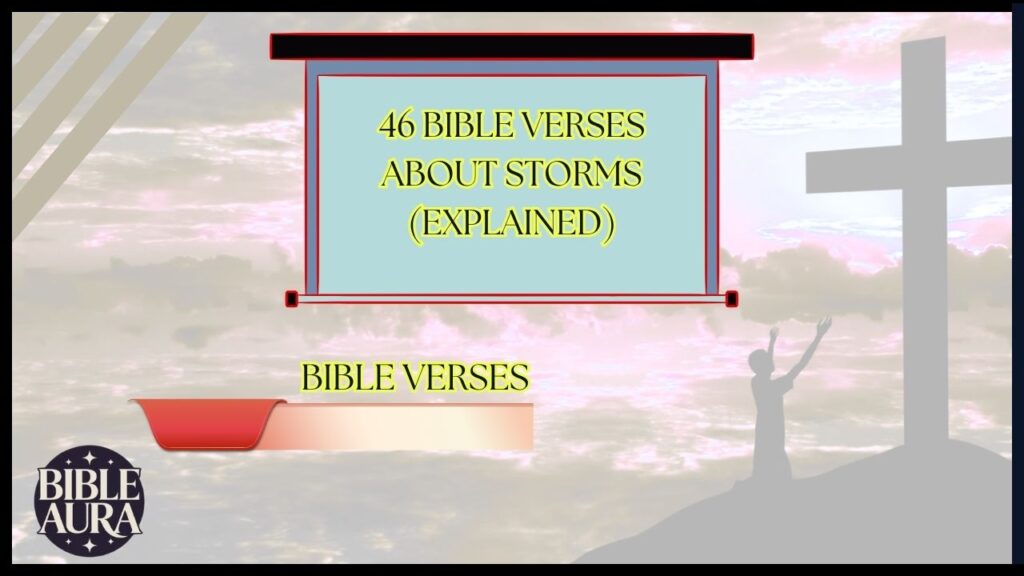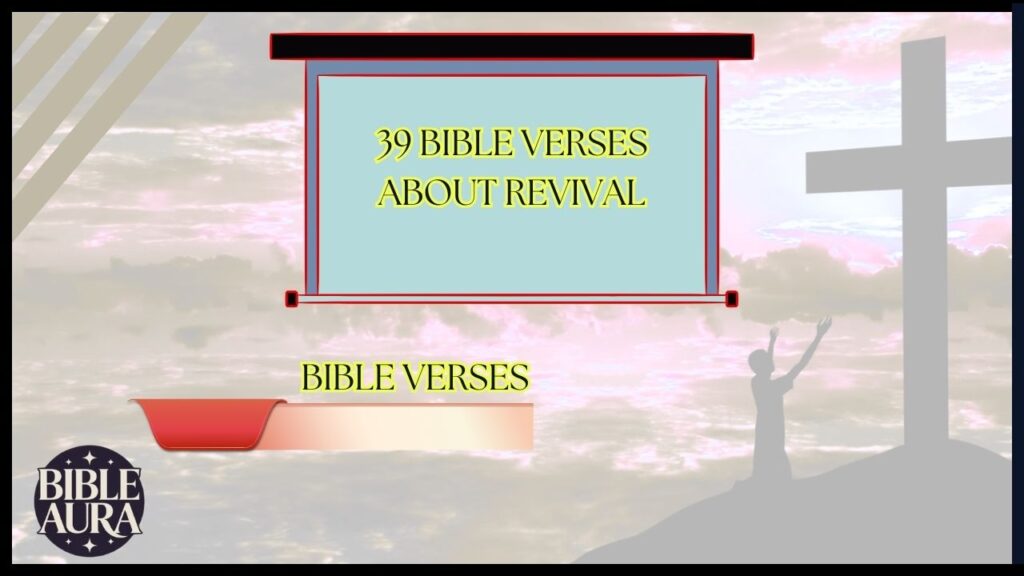Bible Verses About Storms: Life’s storms come in many forms. Physical tempests that shake our homes, emotional turmoil that unsettles our hearts, or spiritual challenges that test our faith. When dark clouds gather, Scripture offers a beacon of hope and wisdom.
The Bible is rich with references to literal and metaphorical storms. These passages remind us that God remains sovereign even in life’s most turbulent moments. From Jesus calming the raging sea to prophets finding God’s voice in the whirlwind, storms in Scripture reveal profound truths about faith, fear, and divine protection.
Whether you’re weathering a difficult season or seeking to strengthen your faith before the next challenge arrives, these verses provide anchors of truth to steady your soul.
Also Read: 36 Important Bible Verses About Karma
God’s Presence in the Storm
1. Psalm 107:29
“He made the storm be still, and the waves of the sea were hushed.”
This beautiful verse reminds us of God’s authority over nature. Just as He can command physical storms to cease, He can bring peace to the turbulent circumstances in our lives. When facing overwhelming situations, remember that the same God who controls the weather is working in your situation.
2. Isaiah 25:4
“For you have been a stronghold to the poor, a stronghold to the needy in his distress, a shelter from the storm and a shade from the heat.”
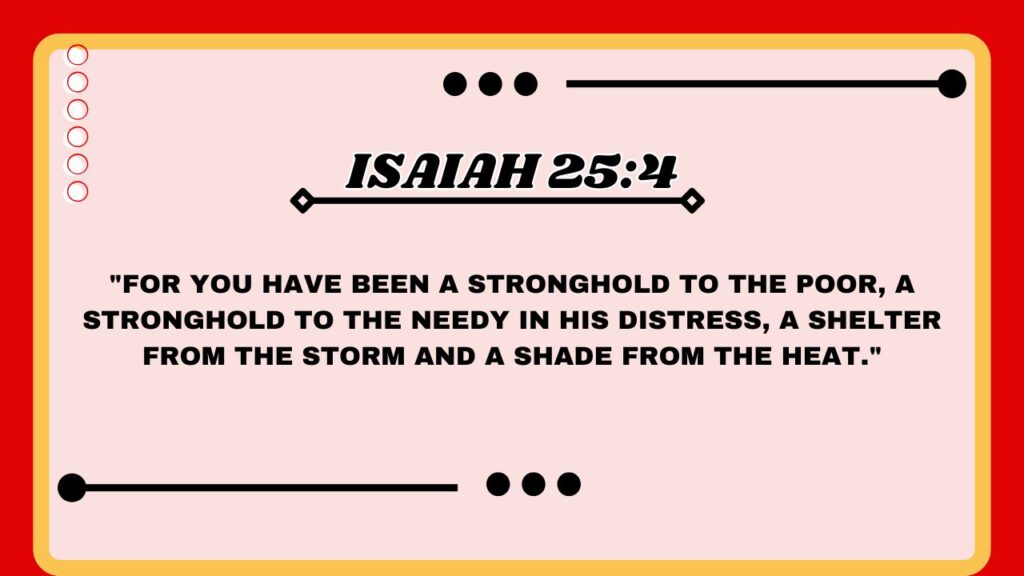
God positions Himself as our refuge during life’s storms. This verse portrays Him as a protective barrier against destructive forces. When you feel vulnerable and exposed to life’s harsh elements, run to God as your shelter and safe haven.
3. Nahum 1:3
“The LORD is slow to anger and great in power, and the LORD will by no means clear the guilty. His way is in whirlwind and storm, and the clouds are the dust of his feet.”
This verse reveals God’s sovereignty and power expressed through storms. While depicting God’s justice, it also shows His majestic control over nature’s most powerful forces. Remember that even the mightiest storms are under His command and may sometimes be channels of His work.
4. Psalm 55:8
“I would hurry to find a shelter from the raging wind and tempest.”
David’s poetic expression captures the human instinct to seek shelter during storms. The psalm acknowledges both the reality of life’s tempests and the necessity of finding refuge. Like David, acknowledge your need for protection when storms arise, and move quickly toward spiritual shelter.
5. Job 37:9-10
“From its chamber comes the whirlwind, and cold from the scattering winds. By the breath of God ice is given, and the broad waters are frozen fast.”
Job’s words highlight God’s control over nature’s most powerful phenomena. Even destructive weather operates within divine boundaries. When natural disasters or personal crises seem chaotic, remember that God still exercises ultimate authority over all creation.
Jesus Calms Our Storms
6. Mark 4:39-40
“And he awoke and rebuked the wind and said to the sea, ‘Peace! Be still!’ And the wind ceased, and there was a great calm. He said to them, ‘Why are you so afraid? Have you still no faith?'”
This dramatic moment reveals Jesus’ divine authority over nature. His rebuke of both the storm and the disciples’ fear shows that faith is the antidote to panic. When fear overwhelms you during life’s storms, hear Jesus asking about your faith and remember His proven power to bring peace.
7. Matthew 8:26
“And he said to them, ‘Why are you afraid, O you of little faith?’ Then he rose and rebuked the winds and the sea, and there was a great calm.”
Jesus connects fear directly to a lack of faith in this passage. His question challenges us to examine what we truly believe about His power and presence. When storms provoke anxiety, ask yourself if you’re focusing more on the threat than on the One who commands the wind and waves.
8. Luke 8:24-25
“And they went and woke him, saying, ‘Master, Master, we are perishing!’ And he awoke and rebuked the wind and the raging waves, and they ceased, and there was a calm. He said to them, ‘Where is your faith?’ And they were afraid, and they marveled, saying to one another, ‘Who then is this, that he commands even winds and water, and they obey him?'”
This account emphasizes the disciples’ astonishment at Jesus’ authority. Their question reveals a growing recognition of His divine nature. Like them, let life’s storms lead you to a deeper appreciation of who Jesus truly is not just a teacher, but the Lord of all creation.
9. Mark 6:48-50
“And he saw that they were making headway painfully, for the wind was against them. And about the fourth watch of the night he came to them, walking on the sea. He meant to pass by them, but when they saw him walking on the sea they thought it was a ghost, and cried out, for they all saw him and were terrified. But immediately he spoke to them and said, ‘Take heart; it is I. Do not be afraid.'”
This passage shows Jesus approaching His struggling disciples in their moment of need. His words “Take heart; it is I” offer profound comfort. When you’re battling life’s headwinds, listen for Christ’s reassuring voice reminding you of His presence and encouraging you not to fear.
10. John 6:18-20
“The sea became rough because a strong wind was blowing. When they had rowed about three or four miles, they saw Jesus walking on the sea and coming near the boat, and they were frightened. But he said to them, ‘It is I; do not be afraid.'”
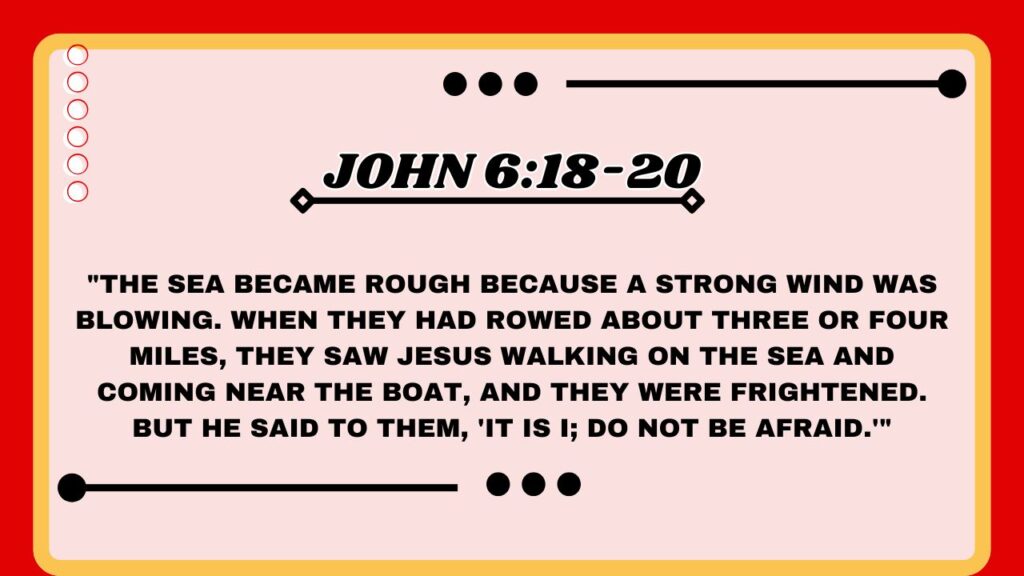
John’s account emphasizes how Jesus comes to us in the midst of our struggles. His self-identification “It is I” echoes God’s name revealed to Moses. During your storms, remember that the presence of Christ transforms frightening situations into opportunities for divine encounter.
Also Read: 37 Important Bible Verses About Discipline
Finding Faith Through Storms
11. Hebrews 11:7
“By faith Noah, being warned by God concerning events as yet unseen, in reverent fear constructed an ark for the saving of his household. By this he condemned the world and became an heir of the righteousness that comes by faith.”
Noah’s story shows how faith prepares us for coming storms. His obedience before the rain began demonstrates the wisdom of heeding God’s warnings. Like Noah, use seasons of calm to strengthen your spiritual foundations, preparing for whatever challenges may come.
12. James 1:6
“But let him ask in faith, with no doubting, for the one who doubts is like a wave of the sea that is driven and tossed by the wind.”
James uses storm imagery to describe the unstable nature of doubt. This verse contrasts faith’s steadiness with doubt’s turbulence. When praying through difficult circumstances, guard against the wavering uncertainty that leaves you spiritually vulnerable to life’s changing winds.
13. Psalm 46:1-3
“God is our refuge and strength, a very present help in trouble. Therefore we will not fear though the earth gives way, though the mountains be moved into the heart of the sea, though its waters roar and foam, though the mountains tremble at its swelling.”
This powerful psalm declares confidence in God despite catastrophic natural disasters. The imagery of mountains falling into seas depicts the most extreme circumstances imaginable. No matter how severe your situation, these verses encourage unwavering trust in God’s protective presence.
14. Matthew 7:24-25
“Everyone then who hears these words of mine and does them will be like a wise man who built his house on the rock. And the rain fell, and the floods came, and the winds blew and beat on that house, but it did not fall, because it had been founded on the rock.”
Jesus uses storm imagery to illustrate the importance of building life on His teachings. The contrast between houses on rock versus sand shows how crucial spiritual foundations are. Apply Christ’s words daily to your life, creating resilience that withstands life’s inevitable storms.
15. 2 Timothy 1:7
“For God gave us a spirit not of fear but of power and love and self-control.”
While not directly mentioning storms, this verse addresses our response to frightening circumstances. Paul reminds us that fear doesn’t come from God. When storms of life trigger anxiety, claim the divine gifts of power, love, and self-discipline to maintain spiritual equilibrium.
Also Read: 39 Important Bible Verses About Long Life
Storms as Divine Messages
16. Job 38:1
“Then the LORD answered Job out of the whirlwind and said…”
This verse introduces God’s response to Job’s suffering notably spoken from within a storm. The whirlwind becomes the medium for divine revelation. Sometimes life’s most profound spiritual insights come through our most turbulent experiences; be attentive to what God might be speaking in your storms.
17. 1 Kings 19:11-12
“And he said, ‘Go out and stand on the mount before the LORD.’ And behold, the LORD passed by, and a great and strong wind tore the mountains and broke in pieces the rocks before the LORD, but the LORD was not in the wind. And after the wind an earthquake, but the LORD was not in the earthquake. And after the earthquake a fire, but the LORD was not in the fire. And after the fire the sound of a low whisper.”
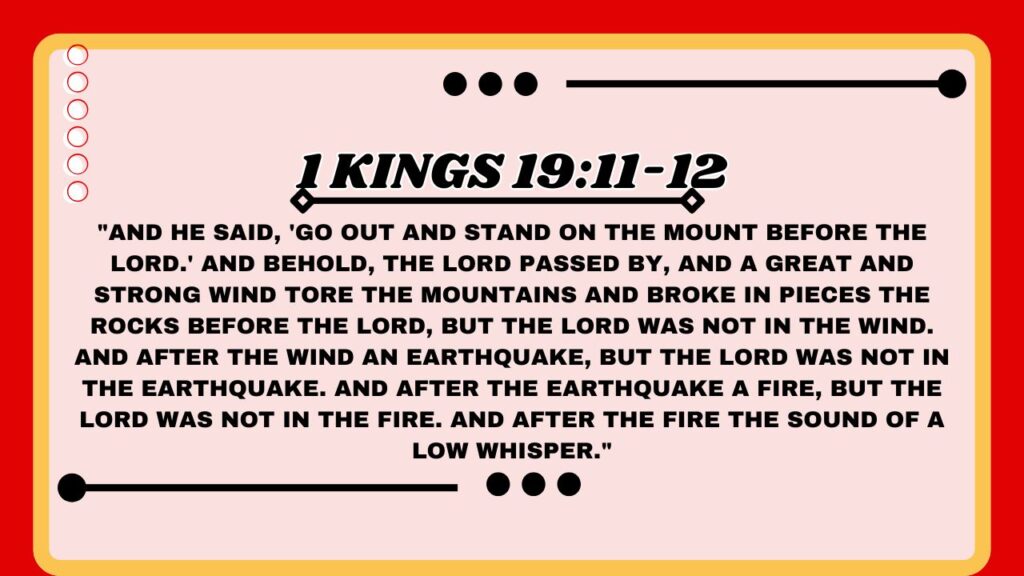
Elijah’s experience teaches that God sometimes speaks not in dramatic demonstrations but in gentle whispers following the storm. This passage reminds us to listen carefully during life’s quieter moments. After emotional or spiritual tempests subside, create space for God’s still, small voice.
18. Psalm 29:3-4
“The voice of the LORD is over the waters; the God of glory thunders, the LORD, over many waters. The voice of the LORD is powerful; the voice of the LORD is full of majesty.”
This psalm connects storms’ awesome power with God’s voice. Thunder becomes a metaphor for divine speech. When you witness nature’s raw power in storms, let it remind you of God’s majestic voice that created and still sustains the universe.
19. Ezekiel 1:4
“As I looked, behold, a stormy wind came out of the north, and a great cloud, with brightness around it, and fire flashing forth continually, and in the midst of the fire, as it were gleaming metal.”
Ezekiel’s vision begins with a storm that introduces a profound divine encounter. The tempest signals God’s approaching presence. Consider that some of life’s storms may actually herald God’s desire to reveal Himself to you in new, transformative ways.
20. Job 36:29-33
“Can anyone understand the spreading of the clouds, the thunderings of his pavilion? Behold, he scatters his lightning about him and covers the roots of the sea. For by these he judges peoples; he gives food in abundance. He covers his hands with the lightning and commands it to strike the mark. Its crashing declares his presence.”
Elihu describes weather phenomena as expressions of God’s judgment and provision. This passage reveals nature’s dual purpose in divine hands. Recognize that storms may sometimes serve as corrective discipline, while also acknowledging God’s abundant provision through natural cycles.
Also Read: 56 Important Bible Verses About Overcoming
Storms of Judgment
21. Genesis 7:11-12
“In the six hundredth year of Noah’s life, in the second month, on the seventeenth day of the month, on that day all the fountains of the great deep burst forth, and the windows of the heavens were opened. And rain fell upon the earth forty days and forty nights.”
The flood narrative describes history’s most catastrophic storm a divine judgment on human wickedness. This account reminds us of sin’s serious consequences while pointing toward God’s redemptive purposes. Consider what areas in your life might need cleansing, inviting God’s purifying work rather than judgment.
22. Exodus 9:23-24
“Then Moses stretched out his staff toward heaven, and the LORD sent thunder and hail, and fire ran down to the earth. And the LORD rained hail upon the land of Egypt. There was hail and fire flashing continually in the midst of the hail, very heavy hail, such as had never been in all the land of Egypt since it became a nation.”
This dramatic storm served as one of God’s judgments against Egypt. The unprecedented severity demonstrated divine power against human oppression. Remember that God’s judgment against evil is part of His justice and love, working toward liberation for His people.
23. Revelation 16:21
“And great hailstones, about one hundred pounds each, fell from heaven on people; and they cursed God for the plague of the hail, because the plague was so severe.”
This apocalyptic vision depicts extreme weather as divine judgment. Notably, it reveals humanity’s hardened response rather than repentance. This sobering verse reminds us to maintain a soft heart toward God, especially when experiencing difficult circumstances that might invite bitterness.
24. Jeremiah 23:19
“Behold, the storm of the LORD! Wrath has gone forth, a whirling tempest; it will burst upon the head of the wicked.”
Jeremiah uses storm imagery to warn of coming judgment against false prophets. The metaphor powerfully conveys the inevitability and force of divine justice. Take seriously God’s standards for truth and integrity, recognizing that teaching others carries greater accountability.
25. Zephaniah 1:15
“A day of wrath is that day, a day of distress and anguish, a day of ruin and devastation, a day of darkness and gloom, a day of clouds and thick darkness.”

The prophet describes judgment day using storm-like imagery. The accumulation of threatening terms creates a sense of inescapable doom. This verse should motivate sincere self-examination and prompt us to share God’s offer of mercy with others while opportunity remains.
Also Read: 40 Bible Verses About Blooming Where You Are Planted
God’s Protection Through Storms
26. Isaiah 4:6
“There will be a booth for shade by day from the heat, and for a refuge and a shelter from the storm and rain.”
Isaiah’s prophecy promises divine shelter for God’s purified people. The imagery evokes the protective booths of the Feast of Tabernacles. Trust that God provides spiritual covering during life’s difficult seasons, especially for those who have embraced His purifying work.
27. Psalm 91:1-2
“He who dwells in the shelter of the Most High will abide in the shadow of the Almighty. I will say to the LORD, ‘My refuge and my fortress, my God, in whom I trust.'”
While not explicitly mentioning storms, this psalm describes divine protection from various dangers. The imagery of dwelling in God’s shelter offers profound comfort. Make consistent communion with God your priority, establishing your spiritual residence in His protective presence.
28. Proverbs 10:25
“When the tempest passes, the wicked is no more, but the righteous is established forever.”
Solomon contrasts how storms affect the righteous versus the wicked. This proverb assures that integrity provides lasting stability. Focus on building righteous character that endures life’s tests, rather than temporary advantages gained through compromise.
29. Isaiah 32:2
“Each will be like a hiding place from the wind, a shelter from the storm, like streams of water in a dry place, like the shade of a great rock in a weary land.”
Isaiah describes how righteous leadership provides protection similar to shelter in storms. This beautiful metaphor shows how godly people become conduits of divine care. Aspire to be someone who offers spiritual protection and refreshment to others navigating difficult circumstances.
30. Ezekiel 13:11-13
“Say to those who smear it with whitewash that it shall fall! There will be a deluge of rain, and you, O great hailstones, will fall, and a stormy wind break out. And when the wall falls, will it not be said to you, ‘Where is the coating with which you smeared it?’ Therefore thus says the Lord GOD: I will make a stormy wind break out in my wrath, and there shall be a deluge of rain in my anger, and great hailstones in wrath to make a full end.”
Ezekiel warns that flimsy spiritual structures cannot withstand divine judgment. The imagery of whitewashed walls collapsing in storms illustrates the failure of false security. Build your spiritual life on truth rather than comfortable deceptions, ensuring you can withstand testing times.
Also Read: 53 Bible Verses About Resilience (Explained)
Storms as Spiritual Tests
31. Acts 27:14-15
“But soon a tempestuous wind, called the northeaster, struck down from the land. And when the ship was caught and could not face the wind, we gave way to it and were driven along.”
This account of Paul’s sea voyage shows how literal storms can become spiritual opportunities. Despite the danger, God used this crisis for testimony. When circumstances seem overwhelming, remember that surrendering to God’s purposes (not the storm itself) can lead to unexpected ministry opportunities.
32. 2 Corinthians 11:25-26
“Three times I was beaten with rods. Once I was stoned. Three times I was shipwrecked; a night and a day I was adrift at sea; on frequent journeys, in danger from rivers, danger from robbers, danger from my own people, danger from Gentiles, danger in the city, danger in the wilderness, danger at sea, danger from false brothers.”
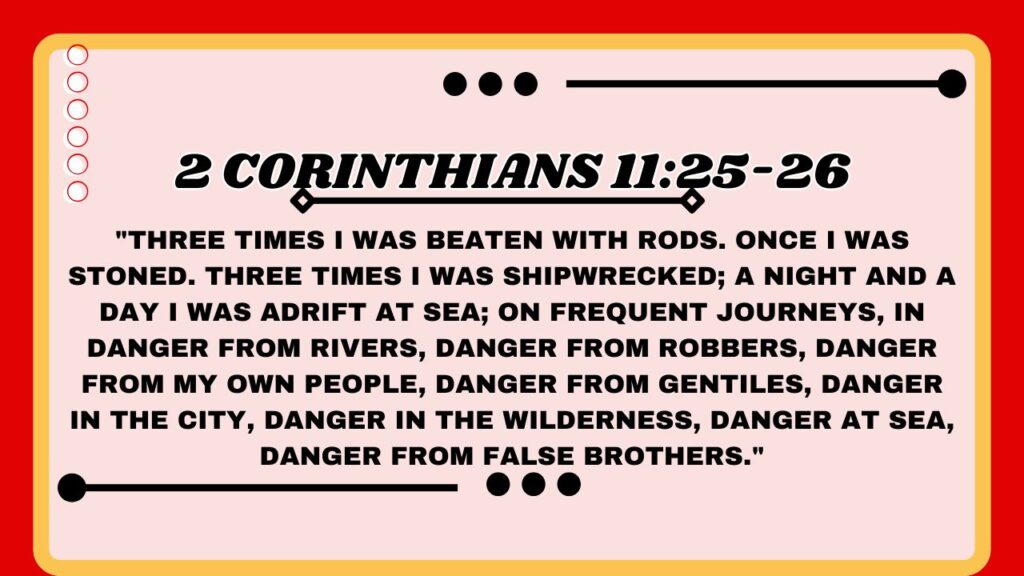
Paul lists storms and shipwrecks among many hardships endured in ministry. His catalog of suffering demonstrates remarkable resilience. When facing your own storms, draw strength from the testimony of those who have endured similar or worse circumstances while maintaining faith.
33. Luke 21:25
“And there will be signs in sun and moon and stars, and on the earth distress of nations in perplexity because of the roaring of the sea and the waves.”
Jesus describes end-time turbulence using storm imagery. His warning prepares believers for escalating global distress. As you observe increasing chaos in the world, maintain spiritual vigilance without succumbing to fear, recognizing these as signs pointing toward Christ’s return.
34. Jonah 1:4
“But the LORD hurled a great wind upon the sea, and there was a mighty tempest on the sea, so that the ship threatened to break up.”
God sent a storm to arrest Jonah’s disobedient flight. This divinely appointed tempest had redemptive purpose. When facing storms following your own disobedience, recognize God’s loving discipline seeking to restore you to your proper course and calling.
35. Job 30:22
“You lift me up on the wind; you make me ride on it, and you toss me about in the roar of the storm.”
Job describes feeling utterly at God’s mercy, like someone tossed in a storm. His raw honesty expresses the disorientation of suffering. When you feel similarly thrown about by circumstances, remember that even this experience can be expressed honestly to God without losing faith.
Also Read: 40 Amazing Bible Verses About Sunsets
Storms and Divine Deliverance
36. Psalm 18:16-17
“He sent from on high, he took me; he drew me out of many waters. He rescued me from my strong enemy and from those who hated me, for they were too mighty for me.”
David uses flood imagery to describe his rescue from overwhelming enemies. The psalm celebrates divine intervention in desperate circumstances. When facing opposition too powerful to overcome alone, trust in God’s ability to reach down and draw you out of threatening waters.
37. Isaiah 54:11
“O afflicted one, storm-tossed and not comforted, behold, I will set your stones in antimony, and lay your foundations with sapphires.”
God addresses His people as storm-battered yet promises glorious restoration. This verse acknowledges suffering while offering hope for transformation. During your most turbulent seasons, hold onto God’s promise to build something beautiful from your brokenness.
38. Acts 27:22-25
“Yet now I urge you to take heart, for there will be no loss of life among you, but only of the ship. For this very night there stood before me an angel of the God to whom I belong and whom I worship, and he said, ‘Do not be afraid, Paul; you must stand before Caesar. And behold, God has granted you all those who sail with you.’ So take heart, men, for I have faith in God that it will be exactly as I have been told.”
Paul’s confidence during the storm came from divine revelation. His faith influenced everyone aboard the endangered ship. When you receive God’s assurances during difficult times, share that confidence with others who are struggling, offering hope based on God’s faithfulness.
39. Exodus 14:21-22
“Then Moses stretched out his hand over the sea, and the LORD drove the sea back by a strong east wind all night and made the sea dry land, and the waters were divided. And the people of Israel went into the midst of the sea on dry ground, the waters being a wall to them on their right hand and on their left.”
God used wind to part the Red Sea, creating a path to freedom. This miraculous deliverance demonstrates divine power redirecting natural forces. Remember that God can use the very elements that threaten you to create your pathway to deliverance and freedom.
40. Psalm 124:4-5
“Then the floods would have swept us away, the torrent would have gone over us; then over us would have gone the raging waters.”

This psalm acknowledges how close Israel came to destruction, using flood imagery. The testimony celebrates narrow escape through divine intervention. Reflect on your own “close calls” with gratitude, recognizing God’s protective hand that prevented your being overwhelmed.
Also Read: 55 Important Bible Verses About Sports
Peace After the Storm
41. Genesis 8:1
“But God remembered Noah and all the beasts and all the livestock that were with him in the ark. And God made a wind blow over the earth, and the waters subsided.”
After judgment came restoration, with wind now serving healing purposes. This verse demonstrates how God brings renewal following devastation. Trust that even after the most severe storms of life, God remembers you and is working toward restoration.
42. Genesis 9:13-16
“I have set my bow in the cloud, and it shall be a sign of the covenant between me and the earth. When I bring clouds over the earth and the bow is seen in the clouds, I will remember my covenant that is between me and you and every living creature of all flesh. And the waters shall never again become a flood to destroy all flesh. When the bow is in the clouds, I will see it and remember the everlasting covenant between God and every living creature of all flesh that is on the earth.”
The rainbow often appearing after storms became God’s covenant sign. This beautiful promise demonstrates God’s commitment to temperance and preservation. Look for signs of God’s faithfulness following your difficult seasons, reminding yourself of His covenant promises.
43. Psalm 107:30
“Then they were glad that the waters were quiet, and he brought them to their desired haven.”
Following the storm description earlier in the psalm comes this picture of safe arrival. The verse emphasizes both relief and destination. After navigating life’s storms, express gratitude for God’s guidance that brings you safely to places of purpose and peace.
44. Ecclesiastes 7:14
“In the day of prosperity be joyful, and in the day of adversity consider: God has made the one as well as the other, so that man may not find out anything that will be after him.”
Solomon advises appropriate responses to life’s changing seasons. This wisdom acknowledges God’s sovereignty over both pleasant and difficult times. Develop the spiritual maturity to find meaning in both your sunny days and stormy seasons, trusting God’s purposes in each.
45. Isaiah 25:8
“He will swallow up death forever; and the Lord GOD will wipe away tears from all faces, and the reproach of his people he will take away from all the earth, for the LORD has spoken.”
Isaiah prophesies the ultimate end of all suffering. This promise points toward complete restoration beyond all storms. When grief and hardship feel overwhelming, lift your eyes to the eternal hope of God’s perfect comfort that awaits beyond present troubles.
46. Revelation 21:4
“He will wipe away every tear from their eyes, and death shall be no more, neither shall there be mourning, nor crying, nor pain anymore, for the former things have passed away.”
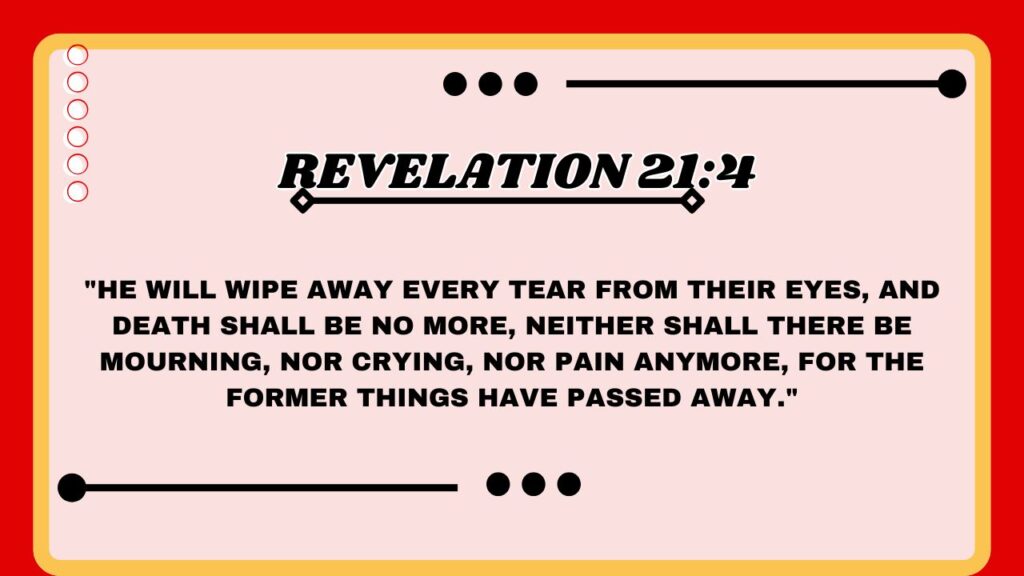
This final promise depicts complete healing after history’s storms. The verse assures the permanent end of all suffering. Hold fast to this ultimate hope that whatever storms you endure now are temporary, destined to be replaced by eternal peace in God’s presence.
Conclusion: Bible Verses About Storms
Throughout Scripture, storms serve as powerful metaphors for life’s challenges and God’s sovereignty. These 46 verses reveal a consistent message: while storms are inevitable, God remains in control. He may calm the wind and waves, speak through the tempest, use storms for judgment or discipline, or simply hold us secure until they pass.
The Bible’s storm narratives teach us to build our lives on the solid foundation of God’s word, to recognize His voice even in turmoil, and to trust His protective presence when circumstances threaten to overwhelm us. Like the disciples who witnessed Jesus calm the sea, our storms become opportunities to know Him more deeply and trust Him more completely.
As you face your own storms whether physical dangers, emotional turmoil, or spiritual warfare let these verses anchor your soul. God’s power over nature reflects His authority over every aspect of your life. His promises remain trustworthy, His presence remains constant, and His purposes remain good even when the winds howl and the waves crash.
Practical Applications
How to Use These Storm Verses in Daily Life
- Create a storm survival kit: Write your favorite storm verses on index cards to keep in your Bible, car, or workplace for quick spiritual reinforcement when challenges arise.
- Develop a storm prayer practice: When anxious about a situation, pray through Jesus’ calming of the storm in Mark 4, personalizing it to your circumstances.
- Start a storm journal: Record the “storms” you encounter and which scripture brought the most comfort, creating a personal testimony of God’s faithfulness.
- Memorize key verses: Commit 3-5 of these passages to memory so they’re immediately accessible when you lack access to your Bible during difficult moments.
- Share storm testimonies: When you experience God’s help during difficulties, pair your story with an appropriate verse to encourage others facing similar challenges.
- Create visual reminders: Display artwork featuring promises like “Peace, be still” or “God is our refuge” in your home as constant reminders of God’s control over storms.
- Form a support network: Gather friends to study these verses together, creating a community that can remind each other of God’s promises during individual storms.
FAQs About Storms in the Bible
Why does God allow storms in our lives?
Storms serve various purposes in our spiritual journey. They may test and strengthen our faith, redirect us when we’ve strayed, reveal areas needing growth, or create opportunities to experience God’s power and deliverance. James 1:2-4 suggests that trials produce perseverance and spiritual maturity.
How should Christians respond during literal natural disasters?
Christians should prioritize safety, help neighbors in need, avoid attributing specific disasters to God’s judgment on particular sins, pray for those affected, and look for practical ways to offer assistance and comfort. Natural disasters also provide opportunities to demonstrate Christ’s love through tangible service.
What’s the difference between storms of discipline and testing?
Storms of discipline typically follow disobedience (like Jonah’s experience) and aim to restore us to right relationship with God. Storms of testing, as with Job, come despite faithfulness and serve to refine and demonstrate our faith. Examining your recent choices can help discern which you might be experiencing.
How can I know if God is speaking through my storms?
Pay attention to persistent thoughts that align with Scripture, counsel from wise believers, circumstances that repeatedly point in a specific direction, and a growing sense of peace about a particular course of action. God’s voice brings clarity rather than confusion, even when speaking through difficult circumstances.
Does God still use weather events to communicate today?
While God can use any means to accomplish His purposes, we should be cautious about assigning specific divine intentions to weather events. Scripture remains God’s clearest communication method. Weather phenomena might prompt us toward biblical reflection and prayer, but we should avoid definitive claims about God’s specific purpose in natural disasters.
Read more knowledgeable blogs on Bible Aura

Piper McMillan is a passionate writer and educator dedicated to sharing the beauty and depth of the Bible. As the author behind the Piper McMillan website, she explores Bible verses, unlocks biblical narratives, and provides insights for living a Christ-centered life. Through warm, approachable, and inspiring articles, Piper guides readers to deepen their understanding of Scripture and apply its timeless wisdom to daily living. Her mission is to uplift, educate, and help others walk faithfully with God, rooted in His word.

